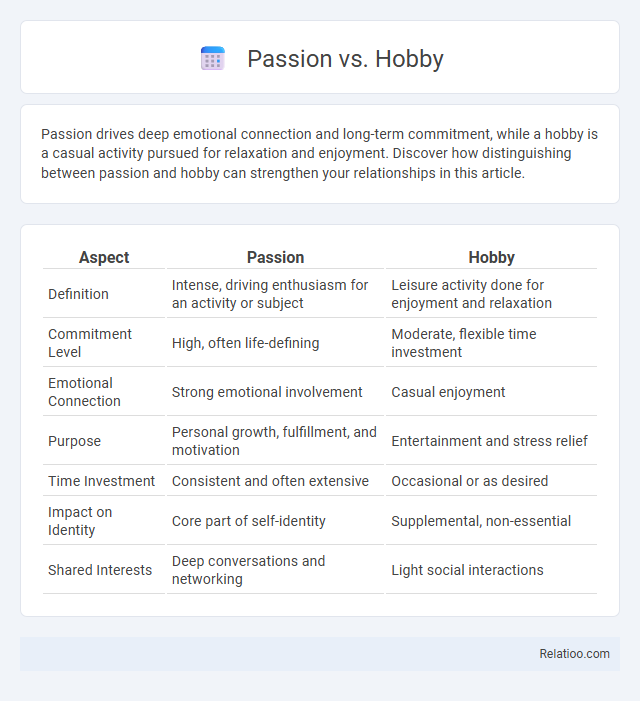Passion drives deep emotional connection and long-term commitment, while a hobby is a casual activity pursued for relaxation and enjoyment. Discover how distinguishing between passion and hobby can strengthen your relationships in this article.
Table of Comparison
| Aspect | Passion | Hobby |
|---|---|---|
| Definition | Intense, driving enthusiasm for an activity or subject | Leisure activity done for enjoyment and relaxation |
| Commitment Level | High, often life-defining | Moderate, flexible time investment |
| Emotional Connection | Strong emotional involvement | Casual enjoyment |
| Purpose | Personal growth, fulfillment, and motivation | Entertainment and stress relief |
| Time Investment | Consistent and often extensive | Occasional or as desired |
| Impact on Identity | Core part of self-identity | Supplemental, non-essential |
| Shared Interests | Deep conversations and networking | Light social interactions |
Understanding the Difference: Passion vs Hobby
Understanding the difference between passion and hobby lies in commitment level and emotional investment; passion drives your core motivation and influences major life decisions, whereas a hobby serves as a casual activity pursued for relaxation or enjoyment. Your passion often aligns with your purpose and long-term goals, while hobbies may change frequently without significant impact on personal growth. Recognizing this distinction helps you prioritize activities that truly fulfill your deeper aspirations.
Defining Passion: More Than Just Interest
Passion is an intense, driving feeling toward a particular subject or activity that goes beyond casual interest or a simple hobby. Unlike hobbies, which are leisure activities done for enjoyment, passion involves deep commitment and persistent motivation that often influences life choices and goals. Pursuing passion requires dedication and resilience, making it a significant factor in personal fulfillment and success.
What Makes a Hobby? Exploring Its Characteristics
A hobby is characterized by its voluntary nature, intrinsic enjoyment, and the absence of external pressure or financial motivation. It involves regular engagement in activities such as gardening, painting, or playing musical instruments, primarily for relaxation and personal satisfaction. Unlike passions or pursuits, hobbies typically prioritize leisure and well-being over achievement or career advancement.
Personal Fulfillment: Passion’s Deep Impact
Passion drives intense personal fulfillment by aligning one's core values and emotions with meaningful activities, creating profound satisfaction and motivation. Unlike hobbies, which often serve as casual or recreational interests, passions evoke deep emotional investment and long-term commitment. Pursuits, while goal-oriented, may lack the intrinsic joy and identity-shaping power found uniquely in passionate endeavors.
The Role of Enjoyment in Hobbies
Hobbies are activities that provide consistent enjoyment and relaxation, serving as a source of personal fulfillment without the pressure of achievement or obligation. Unlike passions, which often require deep commitment and can influence one's identity and goals, hobbies prioritize pleasure and stress relief, allowing you to unwind and recharge. The role of enjoyment in hobbies is crucial, as it fosters ongoing engagement and satisfaction, making them vital for maintaining mental well-being and work-life balance.
Commitment Levels: Passionate Pursuits vs Casual Pastimes
Passionate pursuits demand deep commitment, often driving individuals to invest significant time, energy, and emotion into mastering skills or achieving long-term goals. Casual pastimes, categorized as hobbies, typically involve intermittent engagement meant for relaxation or enjoyment without the pressure of consistent dedication or performance improvement. Understanding these different commitment levels helps differentiate between activities that shape identity and career potential versus those serving as occasional leisure.
How Passions Shape Career Choices
Passions deeply influence career choices by driving motivation, dedication, and long-term satisfaction in professional life. While hobbies provide relaxation and occasional engagement, true passions inspire individuals to develop expertise and pursue meaningful work aligned with their core values. Your passion serves as a compass, guiding decisions that lead to personal fulfillment and sustained success in the chosen career path.
The Importance of Balance: Integrating Both in Life
Finding balance between passion, hobby, and pursuit enhances personal fulfillment and productivity by combining deep emotional engagement with structured growth opportunities. Integrating hobbies provides relaxation and creativity, while pursuing passions drives purpose and long-term goals, preventing burnout and fostering holistic well-being. Emphasizing this equilibrium supports mental health, sustains motivation, and cultivates a resilient, enriching lifestyle.
Signs You’ve Found Your Passion
Recognizing your passion involves a deep, undeniable enthusiasm that energizes you even during challenges and makes time feel irrelevant when engaged. Unlike hobbies or casual pursuits, your passion consistently aligns with your core values and drives your long-term goals, influencing your decisions and lifestyle. You experience a sense of fulfillment and purpose in your passion, and it often ignites continuous learning and growth in your personal or professional life.
Turning a Hobby into a Passion: Is It Possible?
Turning a hobby into a passion is possible when consistent engagement transforms casual interest into deep emotional investment and mastery. Neuroscience research shows that sustained practice and positive experiences activate reward pathways in the brain, reinforcing commitment and enthusiasm. Many successful entrepreneurs and artists began with hobbies that evolved into passionate pursuits, highlighting the potential for growth through dedication and purpose.

Infographic: Passion vs Hobby
 relatioo.com
relatioo.com